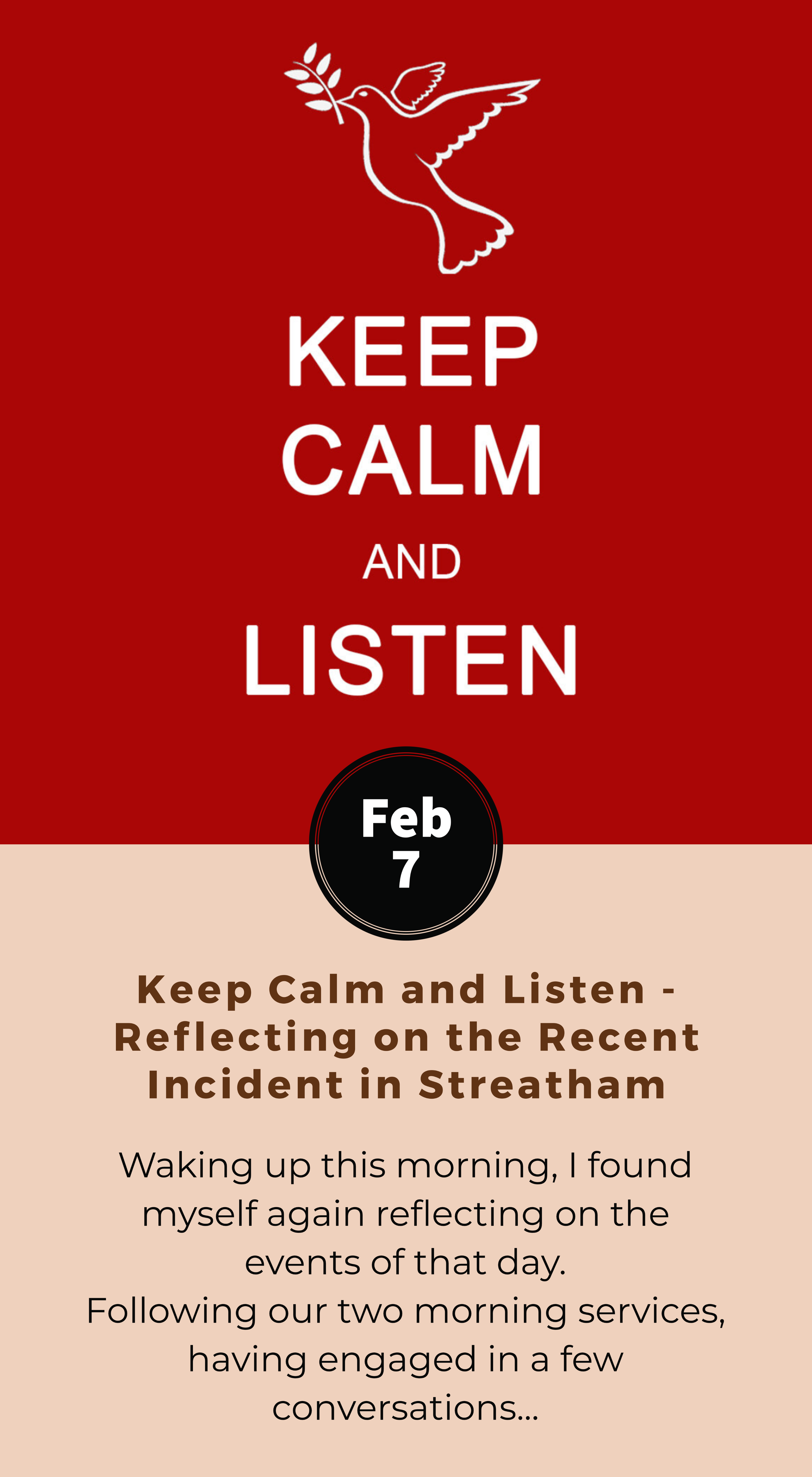Keep Calm and Listen - Reflecting on the Recent Incident in Streatham
Waking up this morning, I found myself again reflecting on the events of that day.
Following our two morning services, having engaged in a few conversations, I left my office to walk home. I intended to have a much-needed Pastor’s nap (yes, this a real thing – even at my age). Just as I was about to lay down to rest, I heard my phone go off. While reaching for my phone, I noticed the sound of a helicopter overhead flying unusually low. I checked my phone and saw a message highlighting that there had been a stabbing and shooting on the High Street less than 400m from my location. For those of you who do not know much about Streatham, it is located in South West London. Streatham High Road’s current claim to fame is that it has the longest and most diverse High Street in Europe. Concerned about how people might be responding I decided to walk up the road and be ‘present’.
Once I arrived on the High Street, I took the opportunity to simply listen. As information started circulating and reporters arrived at the scene, it became apparent that the attack was terrorist related. “This stuff doesn’t happen in Streatham, why Streatham?” was a frequent response from residents referring to the revelation that it might be a terror attack. One thing was clear from these conversations. In moments like this, violence is no respecter of persons. There was a real sense of the fragility of life as people responded to messages from concerned family and friends.
It goes without saying that individuals experience trauma or events differently. What was notable, however, was that the response generally differed between community groups. I was very alive to the fear of reprisals expressed by some and the impact that this event might have on their communities moving forward. Some individuals who witnessed the stabbing had fled war torn countries with the hope of safety and peace in the UK. Business owners had worries about security and impact on trade; young people and young adults, by and large, were disillusioned. One guy in his early 20s said:
“I’m used to this, I decided not to take my phone out because I don’t like that kind of stuff and just went to the pub to avoid the trouble”.
When you hear statements like this your heart does truly break. Violence hurts us all.
Streatham Stands Together
Over the last few days my colleague Rachel and I have been working with others in the community praying, listening and speaking to local service providers. It has been encouraging, hearing how committed the local residents have been to ensuring people are looked after. Stories of people: opening their homes and offering food to neighbours who could not access their homes as they were in the restricted zone; faith community leaders checking on the well-being of their neighbours.
This Saturday local businesses and residents have partnered together as an act of defiance and solidarity. We want Streatham to be a beacon of community cohesion.
The Local Police officers have been truly amazing. They have sought to do their best to reassure local residents of their presence and accessibility and as a Local Church we are truly appreciative of this. To the Christian…
KEEP CALM AND LISTEN
All this begs the question, what can, or should Christians do in times like these?
If there is anything that I’ve learnt from my experience in the Jungle in Calais, it was the power of listening. In psychology we use the term ‘active listening’. Active listening involves the listener attending to the ‘other’. In other words, not thinking about how you might respond while the other person is talking or engaging with an end in mind. Simply put - just being present!
As Christian communities we must avoid the temptation to use one-liners from our cliché jar. Get rid of Christian jargon and platitudes offered as solutions, but in reality, only serving to make us feel better.
More radically, we may want to avoid talking and just listen. Listen to our neighbours well. Hear their fears, ambitions, dreams of what could or should be. Beyond our words, intentionally listening to people and their lived experience and seeing them in their reality without judgement or prejudice is paramount. Choosing to embody the message of the gospel by being present is transformative. Listening informs how we might live our values meaningfully.
The Christian hope empowers us to tap into the universal language that goes beyond culture, age, religion or creed. The language restored to us as followers of the Last Adam. The language that facilitates reconciliation. The language of listening!
This week individuals across the Christian traditions have been intentional in praying for and listening to local residents using Manna Christian Book Store as our base on the High Street.




















